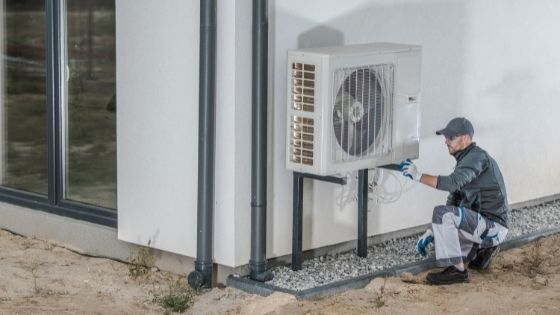During winter, many people just want to stay at home and avoid the freezing weather outside. That’s why running your heat pump is essential to get through the long, cold months. However, your unit sometimes won’t work well, particularly if you disregard problems like heat pump leaking water because you feel like it’s a normal thing to happen.
As such, ignoring this leak may cause damage to your walls, floors, ceilings, and your heat pump itself. If you want a smoothly running unit that gives comfort to your household, you can inspect it to determine the issues that need to be addressed.
Factors Behind Your Heat Pump Leaking Water
You need to use your heat pump 24 hours a day, especially during the cold weather season. But, sometimes, overusing your unit increases the risk of damaging it in the long run. So, if you’re not sure what it causes, here are the things you should always check on your AC.
1. Clogged Draining System
A heat pump has a drain pan that collects condensation from the unit. Often, this pan becomes clogged and leads to a messy puddle with mold and algae. With this, the water may overflow, and instead of sending moisture through the drain line, the water will run over, which causes a leak.
Other than mold and algae, debris and dirt buildup can also cause the draining system to clog. Obstructions in the pipes are also the reasons why there’s a bad smell coming from the drain and a gurgling sound in the flush.
Even if it is easy to check these issues, resolving them, on the other hand, requires professional assistance to do it accurately. You can call a heat pump maintenance specialist so they can remove the clogs in your unit.
2. Dirty and Frozen Coil
Every heat pump has a cold evaporator coil that collects condensation from indoor air. If you see water dripping onto the ground, there’s probably a problem with your cold evaporator coil.
Since it stocks air and passes through another drain, malfunctions may be visible if the coil is covered with dust and dirt. That’s why you need to make sure that the coil is regularly cleaned to avoid this heat pump issue.
The cold evaporator coil needs thorough washing to remove the dust clogging your unit. If you get the services of an HVAC company, their trained technicians will use the proper cleaning method for your cold evaporator coil.
3. Tarnished and Cracked Overflow Pan
Just like an AC unit, a heat pump also accumulates humidity on the coil and goes to the overflow pan. The unit produces moisture that can corrode your overflow pan over time.
If this occurs, the overflow pan will get easily cracked, resulting in water dripping on your floor. With this, a cracked pan reduces the efficiency of your heat pump unit. In addition, a member of the family may slip on a wet floor caused by a cracked overflow pan.
Of course, you don’t want that to happen. So, it is best to call technicians to avoid more serious damage to your heat pump unit and your family. An HVAC company will help you assess if your unit should be replaced or not.
Resolve Your Heat Pump Issues
As a property owner, the best thing you can do is continue maintaining an efficiently working heat pump. To make sure that everyone will have a stress-free winter, have your furnace regularly inspected by a trusted HVAC company. Here are some services that highly trained technicians can provide you:
- System components cleaning and inspection
- Air filter and contaminated refrigerant replacement
- Repairs on drain lines
- Temperature settings inspection and adjustment
- Smart financing options to accommodate your unit’s complications
How Often Should You Have Your AC Unit Checked?
Just like your car, your heat pump unit also needs an inspection to ensure its efficiency in the long run. Experts recommend homeowners to have their unit checked at least once a year. A tuned-up heat pump system can reduce further repair expenses when your unit breaks down. Whether you think your heat pump works just fine or leaks water, it is best to approach experts in this field.

